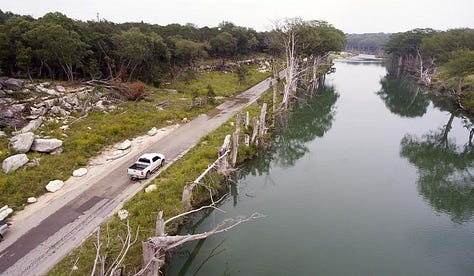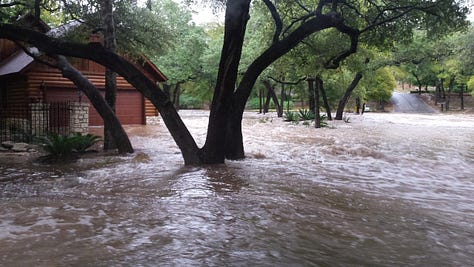Hello friends and readers. Today I offer the brief second chapter of my upcoming and yet-to-be-titled book about KWVH Wimberley Valley Radio.
The introductory chapter is located here and is still free to all.
It is a project of love—the power of community—and of telling the stories of many others along with my own. This amazing community radio station rose from the prescient idea and relentless nature of one woman to raise up her small Texas community. Eight years later the station has over a hundred active volunteers—a Board of eighteen committed souls—24-7 programming—business underwriters throughout the community—hundreds of regular donors—a Texas Association of Broadcasters Award for Community Excellence—and tens of thousands of listeners locally and in 25 countries via streaming. It is a story that I’ve been a part of since very nearly the beginning. It’s a story that needs to be told.
In addition to my normal free weekly fare, chapters of this powerful start-up tale will be unfolding over the coming months behind the paywall here on Of a Sober Mind. I offer you a preview here. Feel free to become a paid subscriber for a nominal fee if you’d like to follow along. My normal fare will continue weekly for those who choose to remain free subscribers.





It shouldn’t have happened. But it did. It was Saturday, May 23rd. Memorial Day weekend 2015. Many fears were realized in the community of Wimberley. Many weaknesses were exposed. Nature won. The “Texas Flash Flood Alley” is one of the most notorious in the country. Communities all around Wimberley had been dealt a destructive and often fatal hand. Wimberley had somehow managed to survive these previous attempts on her spirit. This holiday weekend, like most spring seasons in Wimberley, was packed to the gills with regular annual visitors from Houston and other regional areas. They came to enjoy the somewhat cooler temperatures provided by the slight elevation, the copious canopies of live oak and ancient Cypress spread throughout the valley, and of course the Blanco River. Those only familiar with Wimberley, Texas from a long-ago childhood visit will recall the majesty and color of the Cypress stands along the River Road and Flite Acres Road, which both skirt the Blanco as it meanders through Wimberley. “This doesn’t look like what I thought Texas would look like” they would exclaim. Natural dams create swimming holes. Rocky limestone breaks create light rapids. Mostly though it’s floaties and lawn chairs and coolers and sunscreen and smiles.
There’s no way for me to do justice to the story of the Wimberley floods in 2015. I won’t try. I moved to town in May 2016 a full year later and it was all anyone could still talk about. If you live here, chances are you lost a friend or have a friend who lost a friend or a house, or simply had to endure and participate in the recovery. A second flood hit town on Halloween of the same year, affecting Cypress Creek more than the Blanco, and uprooting merchants and buildings in the quaint town square. The community was still recovering. Purple Wimberley Strong flags hung everywhere.
For a powerful and colorful article recapping the terrible weekend, try Jamie Thompson’s article in Texas Monthly Magazine from May, 2016 entitled “When the River Rises.”
For the purposes of this tale about the birth of KWVH radio, it was a seminal occurrence. The premise of creating a community radio station for the express purpose of being a local voice for information and resources to the community in times of emergency...that fundamental motivation was now painfully and tragically upon the town of Wimberley. Raybuck and her Board had held meetings, drawn up their charter and other 501C3 documentation, had a small stash of production equipment, a few hundred dollars in the bank account…they were ready. They had been broadcasting bits and pieces of programming via the Internet by recording from the basement of the First Baptist Church building in the Blue Hole parking lot. But in order to begin broadcasting over the airwaves in any manner required authorization and a license from the FCC, who had been sitting on the application for a really long time.
As Mac McCullough tells it, he and Steve Thurber are standing in a parking lot south of the Ranch Road 12 bridge over the slowly receding Blanco River. Four days have elapsed since the flood. Texas Senator John Cornyn is in town to offer support. The town of Wimberley is still locked down with limited access. Mac recalls Cornyn approaching the two of them and asking what he can do to help. Steve Thurber was the Mayor of Wimberley and Mac was a Councilman. Thurber did the talking. McCullough recalls the conversation like this. Cornyn: “Gentlemen, what can I do within my power to help you?” Imagine that behind the three men is a vast sea of first responders, vehicles, trucks from Home Depot, Lowes, Ace Hardware, HEB, the Red Cross. Thurber points to McCullough and says, “Senator, you can help get this guy off my back about this crazy radio station idea.” Cornyn looks at Mac and says, “tell me more.” McCullough says that he stammered a bit then said to Cornyn “well we’ve had this pursuit going for a few years to put a community radio station together in Wimberley for exactly the purpose of being an information source during times of emergency or important events. We haven’t been able to get any clearance from the FCC even though we’ve applied under their terms—so we’re kinda stuck.”
Texas Senator John Cornyn immediately calls his office in Washington DC, gets his first assistant Michelle Chin on the phone, and hands the phone to McCullough. “Tell her about it.”
Mac does just that and she instructs him to fax over any written documentation when he gets home. As Mac recalls he did that very thing at approximately 10 pm that night after a very busy day. The only comment back from the Congressional Aide at that point was “looking into it.”
To McCullough’s recollection it was about 18-19 hours later he received a phone call from a 212 area code number and it’s Michelle Chin. “Mayor.” McCullough was not yet Mayor, Thurber was.“Mayor, you may proceed.” Mac remembers challenging that statement with a question; “what do you mean?” He recalls Chin saying; “go ahead and start broadcasting on the FM frequency you were assigned in your preliminary discussions. I’ve received verbal emergency approval for 30 days. You’ll receive a written authorization in a couple of days and you’ll have to follow the protocol to try to extend that or turn it into an actual license to broadcast. You may proceed.”
7 days later, Susan Raybuck received in her home mailbox a letter dated June 5, 2015. On the letterhead of the Federal Communications Commission, from the desk of James D. Bradshaw, Deputy Chief of the Audio Division, the letter stated;
Dear Applicant: This is in reference to the above-captioned license application and the request for Limited Program Test Authority ("LPTA") filed by Wimberley Valley Radio ("WVR"). In the request, WVR indicates that the station has constructed the facility as authorized per the underlying construction permit, BNPL-20 13111 2AJQ, with the exception of using a one-bay antenna instead of the originally proposed two-bay antenna. WVR explains that Wimberley and the surrounding area have suffered damage from major flooding, and several local communities have been declared an emergency disaster area. WVR further explains that operating with the one-bay antenna will enable the station to immediately provide emergency information to nearby residents, while the station awaits delivery of the required antenna. In light of the above, Limited Program Test Authority IS HEREBY GRANTED to commence operation in accordance with the terms and conditions of Construction Permit BNPL2013 1112AJQ and the provisions of 47 C.F.R. § 73.1620, pending further action on WVR's license application. This limited PTA expires on July 6, 2015. Extension of this limited PTA is not anticipated.
Among all of the fascinating aspects of the issuance of this limited PTA, and there are many, is the last line of the statement: “Extension of this limited PTA is not anticipated.” This was most certainly not a foundation on which to build a radio station. But it was a start.
Raybuck immediately went into scramble mode with her small team of “can-do” fellow Board members. McCullough in particular didn’t mince words. He circulated an email in the strongest of terms, stating that ‘we have to get this damn thing on the air.’ Susan placed a call to her new radio friend Jim Ellinger at Austin Radio Airwaves—a low power radio activist and proponent—up in Austin, who would deliver a small transmitter making a broadcast possible.
Within a week of the devastating floods, several volunteers were atop the Wimberley residential neighborhood of Paradise Hills, on Mac McCullough’s property, hoisting an antenna that would be lashed to his existing ham radio tower. It would serve the purpose in the short term. “Surreal” is how several of them describe the moment. From Susan Raybuck’s perspective, it was equal measures of relief and pressure. Somehow, someway, they had the authority and the ability to broadcast a small local signal over the FM airwaves. Although they’d been doing internet radio for quite some time, this was different. This had a feeling of legitimacy even if it was completely temporary.
On the FM frequency 94.1 at appointed hours during the day KWVH began broadcasting emergency information about resources and activities of recovery in the town. The time-of-day broadcasts were publicized through the Facebook page, which was growing in followers. Susan would sit with McCullough in his attached office/barn, surrounded by electronic equipment unrelated to the station, and talk into a small microphone attached to a laptop attached to a transmitter borrowed from Jim Ellinger, wired to an amplifier, routed to the transmitter antenna duct-taped to Mac’s ham radio tower in his side yard.
The Wimberley Valley Radio team was operating in the present moment. It was all they had. Being able to react to a weather emergency in their community was exactly their reason for existence. They may have had hope of being something more at some point, but it was a start. The FCC had authorized emergency broadcasts, and what would come tomorrow would be what would come tomorrow. The saying goes: ‘can’t see the forest for the trees’ and it applied to this frenzied moment in time. It is only with the perspective of 8 years that the remarkable accomplishment that is now KWVH becomes apparent. A year later in August 2016–KWVH Wimberley Valley Radio–under a now-received full low-power FM license would begin a 24-hour on-air broadcast schedule.
The miracle that is Wimberley’s non-profit community radio station was on baby legs but growing quickly.
Coming Soon: CHAPTER 3: Susan the Fearless! Like a Viking—eyes on the horizon—heart with the Gods



